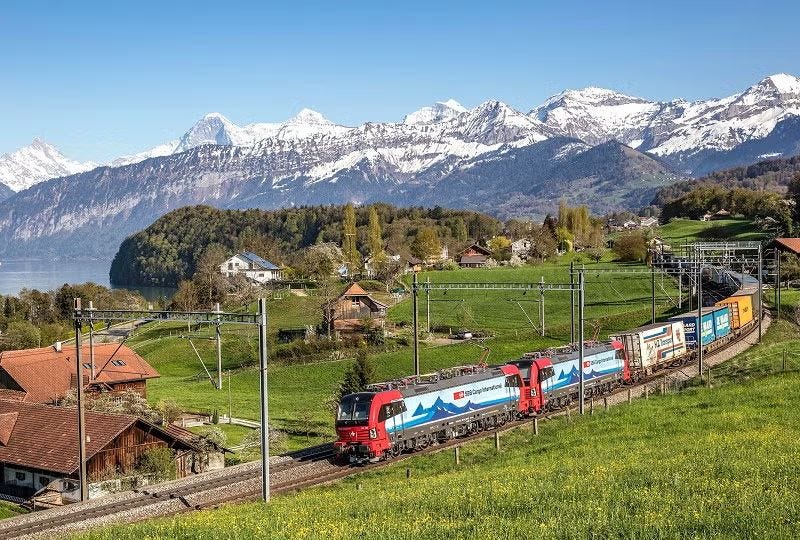Europe's railway profitability myth: Why billions keep disappearing

Italy's state railway announces yet another attempt to become profitable through logistics integration. It will fail. Not because the strategy is wrong, but because the entire premise of commercial railways contradicts both economic reality and climate necessity.
This week, FS rebranded its freight division as FS Logistix, aiming to become a full-service logistics provider. CEO Sabrina De Filippis speaks confidently about capturing market share. We've heard this before – from Deutsche Bahn, from SNCF, from virtually every state railway attempting to square an impossible circle.
The uncomfortable truth Brussels and European governments struggles to acknowledge: European railways are fundamentally incompatible with commercial profitability. They represent Europe's transport challenge not due to poor management, but because we've built a system based on contradictory goals.
The systematic failure
DB Cargo loses EUR 500 million annually despite being Europe's largest rail freight operator. SNCF requires constant state support. Even supposedly successful operators like SBB Cargo only survive through hidden subsidies. PKP Cargo in Poland approaches bankruptcy. This isn't coincidence – it's structural.
Four fundamental contradictions
The infrastructure trap. Railways pay substantial track access charges for every kilometer traveled. Meanwhile, trucks pay minimal road tolls that cover only a fraction of their infrastructure damage. Airlines enjoy tax-free fuel and other exemptions that the EU itself values at tens of billions annually. The "level playing field" doesn't exist.
The political straightjacket. Railways must simultaneously run unprofitable regional services for social cohesion, maintain loss-making night trains for environmental goals, and compete commercially against subsidized competitors. No private business would accept such contradictory mandates.
The investment paradox. Locomotives last 30-40 years, but technology cycles turn in 5-10. ERTMS costs billions to implement but generates zero additional revenue. Meanwhile, airlines lease aircraft and trucking companies upgrade fleets continuously.
Market geography. Rail freight only works for point-to-point bulk transport. But Europe's economy demands flexible, networked logistics. Trucks deliver door-to-door. Rail needs expensive first and last-mile solutions, transshipment terminals, and coordination between multiple operators.
Switzerland proves the alternative
Switzerland invests approximately 0.5% of GDP in rail infrastructure, with total public transport spending exceeding CHF 5 billion annually. The result? Europe's only genuinely functional railway system with 39% modal freight share – nearly double Germany's 21%.
Here's the paradox: Germany achieves 21% modal share and still loses billions. This proves the problem isn't market share but the commercial model itself. Switzerland succeeds because it doesn't pretend railways are commercial enterprises. They're public infrastructure, like roads. Profitability isn't the measure – system efficiency is.
Solutions nobody wants to implement
Option One: The Infrastructure Model. Accept railways as public goods. Stop demanding profitability. Fund them properly from general taxation. This works in Switzerland but requires abandoning 30 years of liberalization ideology.
Option Two: True Cost Competition. Make other modes pay real costs. Aviation fuel taxes alone would generate tens of billions annually. Proper road pricing reflecting actual infrastructure damage would transform trucking economics. Rail becomes competitive overnight. But lobbying and voters wanting cheap flights make this impossible.
Option Three: Radical Simplification. Abandon infrastructure competition. Return to integrated national railways. Standardize everything. Save billions in complexity. But this means admitting liberalization failed.
The Brussels contradiction
The European Commission wants everything: modal shift for climate goals, competition to reduce costs, profitability to avoid state aid, and universal service for cohesion. These goals are mutually exclusive.
The Fourth Railway Package promised competition would improve services and reduce costs. Instead, we have fragmented systems, incompatible booking platforms, and operators cherry-picking profitable routes while states subsidize the rest.
Time for honesty
FS Logistix will fail like DB Cargo's logistics ambitions failed, like SNCF's freight division required selling. Not because Italian management is incompetent, but because the task is impossible.
Railways are natural monopolies with massive social benefits that don't appear on profit statements: reduced emissions, decreased congestion, regional connectivity. We don't demand highways make profits. Why pretend railways should?
The Green Deal demands doubling rail freight by 2050. That won't happen through rebranding exercises. It requires fundamentally reconsidering what railways are for and who pays for them.
Europe faces a choice. Continue the profitable railway fiction while roads and aviation capture market share, undermining climate goals. Or admit railways are public infrastructure requiring public funding, and invest accordingly.
Until Brussels acknowledges this reality, European railways will remain caught between impossible demands – bleeding money, losing market share, and failing the climate challenge while politicians wonder why their liberalization medicine isn't working.
The medicine isn't working because the diagnosis is wrong. Railways aren't failing businesses needing market therapy. They're public infrastructure pretending to be businesses. And that pretense is costing Europe its transport future.
The Rail Agenda delivers analysis that cuts through industry PR and political positioning. Because understanding why policies fail is the first step to making them succeed.

